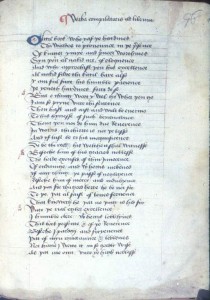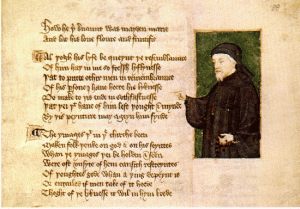I haven’t written yet about what is probably my personal favorite of the SIF projects, an ambitious digital humanities project called the Hoccleve Archive, which is attempt to create a digital variorum edition of Thomas Hoccleve’s early 15th century poem, the Regiment of Princes. One aspect of this poem is the complex computing and scholarly challenge of collating, displaying and digitally ‘marking-up’ a 5500 line poem which exists in 43 different manuscript versions.
In addition to these manuscripts, the Hoccleve Archive project hopes to conserve and make accessible a huge amount of material gathered in the 1980’s and 1990’s for what turned out to be a (very productive!) failure to produce a printed variorum edition of the Regiment. This extra material, which gives the Hoccleve Archive huge head start, includes over 6000 handwritten collation sheets, and nearly 150 text-based computer files containing an archaic, but still legible orthographic and lexical mark-up of Hoccleve’s holograph manuscripts.
Using these materials, however, is far from straightforward. The mark-up of the new, all digital archive will be done XML/TEI (a specialized tag set for manuscripts and literary documents), whereas the older mark-up was done in a customized language, which the computing end of our team (Ram, Sruthi, Rushitha), are translating into XML/TEI. Figuring out how to use the handwritten collation sheets, which have been scanned, but will also need considerable work to convert into digital form, is another looming computing challenge.
I, of course, am no programmer, though I have been acquiring some XML over the last few weeks and should be fairly proficient in it soon enough. To me, what is most engaging about the project is how it uses these multiple generations of editorial tools to make visible the history of editing, and – when combined with the pedagogical features that the Hoccleve Archive hopes to build – to teach students the techniques of textual scholarship.
The idea is to use this collection of artefacts to turn the Hoccleve Archive into both a home for Hoccleve’s Middle English text and for three historical levels of its editorial processing, ranging late medieval manuscript production and transmission through the early days of the digital humanities, and into the present. Our hope is that we can build interest not only in the poems as poems, but as platforms for the study of the historical production of texts and of contemporary digital practice. Much of this is down the road a ways (maybe years off), but the idea is to build a crowd-source style computing platform that will allow a community of interested researchers and of teachers to work on the edition of the Regiment. This will not only serve to provide labor for what is a massive scholarly project, but it will give large numbers of people the opportunity to develop meaningful skills as scholarly editors.
To me this is pure beauty. One of the things I have been most excited to discover about the digital humanities is the extent to which they can revitalize very-old fashioned, dusty, and venerable skills we associate with the most pedantic, least applicable branches of the humanities. Yet, as these tremendous archival materials continue to come online, they pose huge questions about who will know how to handle them and make their ‘translation’ from physical objects to digital representations meaningful and rich. This is work for people trained in paleography, collation, descriptive bibliography, the technical vocabulary of poet texts, meters, rhyme schemes, philology and a host of other skills that are just as necessary to make our image of a digital archive functional as are computing and programming skills.



